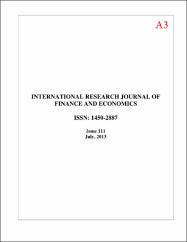Financial Openness and Capital Mobility: A Dynamic Panel Data Analysis

View/
Access
info:eu-repo/semantics/openAccessDate
2013-07Access
info:eu-repo/semantics/openAccessMetadata
Show full item recordAbstract
This study estimates saving and investment correlations for the Central and Eastern Europe (CEE) transition economies and the G-20 countries to assess the degree of capital mobility. Employing GMM, this study uses financial openness, financial freedom and foreign aid over the period 1990–2011. The study finds that saving-investment correlation for G-20 countries is lower than that for CEE transition countries. Our findings suggest that financial openness and financial freedom significantly increase capital mobility in the CEE transition countries, but does not have a significant impact on capital mobility in the G-20 countries. These findings indicate that a CEE transition country with more financial openness can have more access to external capital market for borrowings and increasing financial freedom will enhance capital mobility in CEE transition countries. Moreover, the estimation results do show that the previous findings in the FH literature, that capital is more mobile for G-20 countries than CEE transition countries.

















